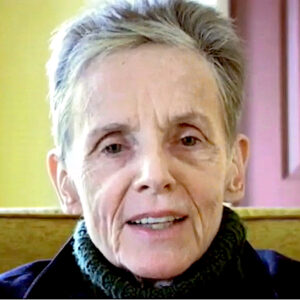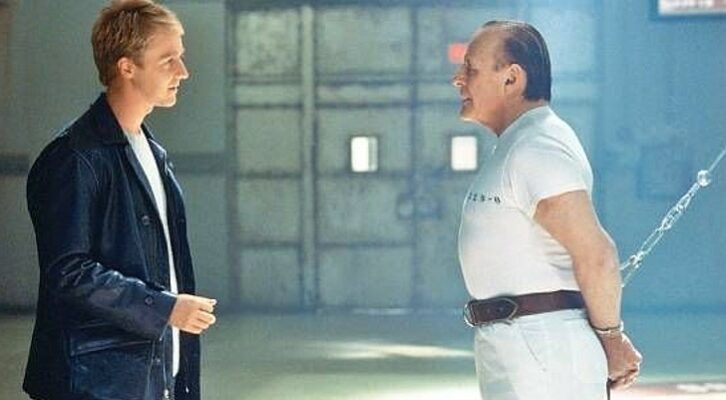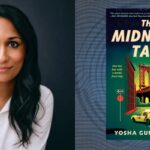We gathered in a boardroom. There were almost no women on the English faculty back then so three men were on my dissertation committee: a professor from philosophy, one from comparative lit, and Lars, my dissertation director. Their examination questions across the seminar table were thoughtful, their remarks encouraging. But at the end of my defense, Lars announced he had a final question. He was an acclaimed novelist, and for two and a half years, he and I had talked about nearly everything to do with writing and contemporary literature. I thought he might ask about Victorian plot structure, or maybe about the deconstruction of the literary narrative, or possibly something about Orientalism and the post-colonial appropriation of the heroic.
He placed his hands on the table and cleared his throat. “If you had to choose between never ever seeing your family again and never writing again, which would you pick?”
The philosopher groaned audibly, lowering his head.
“You don’t have to answer that,” the comp lit professor said.
Was Lars kidding? I nearly laughed, but instead I blurted, “It sounds like you’re asking if I’m a man or a woman.”
Lars scowled. “No, no—I mean this professionally. What sort of choice would you make?”
“So…” I shifted in my seat, stared at my useless notes, then once again heard myself saying, “Professionally… Like… a male writer would supposedly say something like, I don’t need to see my family and all those distractions? I’ll just go to my mountaintop and create.” I was still smiling, not quite sure if this was all a joke, but a note of irony had crept into my voice. The back of my head felt heavy: I felt the weight of the day, the sleepless nights anticipating these defense questions, the anxiety over finishing my studies, over finding work, over making sure I wouldn’t have to move back home. “A woman, I guess, is supposed to say, oh gee, it’s ok—never mind about all this time and money and work I’ve put into my career—I’ve got to nurse babies and take care of my husband. Like, mothers don’t have time for writing anyway.” I glanced toward the flat reflections in the windows, unsure if I’d just compromised my graduate degree. “I suppose that doesn’t really answer your question, but I don’t know. I guess I don’t believe in it—the choice between making art and having a life. People do both all the time, don’t they?” I spoke confidently, but a cool current ran over my skin. Don’t they?
The question hung there above the table.
Lars gave me a narrow, unsatisfied look; he folded his arms. But I passed my defense.
* * * *
In graduate school, my advisors rarely addressed the fight for time—that eternal conflict between making money and making art. They did hint at it, though, each time they counseled me to stay free and independent. These days, my students can hardly believe it when I tell them about the sorts of life advice my writing mentors dished out 20 years ago. My young female students especially, for whom life is filled with glorious possibility, insist I must have misunderstood. “No one would actually say that,” one protested. “That you flat out just shouldn’t have kids.”
But they flat out did. While none of my professors warned against marriage, I’d been advised, directly, and by more than one of them, not to have children. At the time, in fact, I’d sensed that this was meant to be a compliment—that they’d taken my writing seriously enough to suggest I not sacrifice it for a family. And the attitude persists, the belief that there is only so much time and women—no matter how accomplished or creative—are expected to devote themselves to their families. In a recent interview, Shonda Rimes and Oprah herself commiserated over the challenge of having both a high-level career and family. “I have so much going on inside my head in terms of writing, there’s such a large space in my life taken up by that,” Rimes confided. “I can’t imagine it being taken up by a husband and children and writing, and everything getting its due,” she said. “I don’t believe there is room for all of it. I really don’t.”
It seemed somehow a woman couldn’t—or shouldn’t—have both. A man could—he just needed a wife. “Kids change you,” I’d been told by family, friends, and teachers, over and over. “Your life changes forever. Completely.” They made it sound like a form of tiny death.
* * * *
I knew many women writers who didn’t have children. I also knew several mothers who’d stopped writing, working, publishing, socializing—just, apparently, stopped. My friend Elsie had two young kids and had written a total of two poems since their births. When I mentioned to her how ambivalent I felt about having children, her own frustration welled up in response. “You can’t have everything,” she scolded me. “You’ll write books.”
I married my grad school boyfriend and began my professional life teaching in an MFA program at a big university; there, I spent whole days leaping from classes to advising to committee work. When one is a career academic, that’s the nature of the beast—it’s simply what you must do. But when teaching is what you do to support your writing habit, the pull and press of responsibilities can be utterly maddening.
The rest of life was on hold. My silent, guilty secret was that I’d always believed I’d have children; I felt a sort of inevitability about it: parenting seemed whole and satisfying, rich and real, yet also almost mystical. Ineffable. But none of my young colleagues even talked about having children. And I was so exhausted I could barely stay married. After a few years of teaching, I divorced, then at the end of my thirties remarried. Scott, my new husband was perfectly content being child-free and he worried that having kids would take my focus off my writing. It all felt so much like a Sophie’s choice—that I’d have to let one die in order to save the other. For some, apparently, the decision comes easily, for me, it was a long and fiery debate.
At some point I realized I was waiting for my body to make the decision for me. I’d time out, I’d reasoned, and then there wouldn’t be any more decisions to make: I wouldn’t keep thinking and fretting about it. But once I reached my forties, I didn’t come to that serene acceptance. One day, I talked to another friend—a novelist without kids—about my terrible debate. Hannah nodded, then told me: there is no wrong choice. She repeated herself, intently, her eyes on mine: It will be fine, no matter what you choose. There is no wrong choice.
It was what I needed to hear. I was 44, almost 45, on that day when I felt it in my bones—the desire I’d lived with for years—that I must have a child, that the desire would be fulfilled or it would consume me whole.
A week later, a fertility doctor told us it wasn’t a good idea to use my own eggs, so my husband and I began the process to adopt. It took another two years of research and paperwork before we were matched with a birth mother and our daughter was born.
* * * *
Lars was right: kids take time. They chew up your days and nights, uncouple your focus, shatter your thoughts. Just when you’re on the verge of finally working out a crucial point or complicated metaphor, kids will come badgering you for popsicles. For years, the only movies you see will be animated and you’ll be grateful for those because it’s your sole chance for a nap, and yes, if you’re tired enough you can get quality sleep sitting up in a child-crazed movie theater.
And Lars was wrong: the issue isn’t strictly about time. It’s about focus. Having a child meant I to take a hard look at the ways I spent time and frittered it away. I had to learn how to take myself offline, for starters, to follow the same rules that we set for our daughter, like, No computers at dinner. It’s easy to tell yourself that you’re an irrepressible free spirit, a wild and crazy artist, but those are the sorts of writers who have trouble coming to the desk, baby or no.
Grandmothers these days are out learning tae kwon do and flying planes. So I learned about babysitters—that good ones are rare as stray gazelles on the savannah. But capture one for a while and you can start to get your working life back. We couldn’t afford a full-time nanny, but we managed to have someone come in for a morning or afternoon a couple of times each week. And I found that, for me, the big key was two hours. Two golden, unbroken hours. One hour for doing the work that supports the writing, the other hour for the writing itself. If you have two dependable hours, you can do what is needed.
After years of describing myself as a “cumulative” writer—in which I wrote in-between times—after lunch dates, before dinner parties, arriving early to the dentist, stuck in traffic—I knew it was time to consolidate. I became more adept at saying no, especially to tasks I used to do out of a sense of obligation. I shed some committee work and almost all phone calls. We rarely go out to dinner. I no longer teach summer classes or extra workshops. The sky hasn’t collapsed, and we are getting by. Distraction, it turned out, was an expensive luxury.
In the seven years since my daughter’s birth, I published another novel and another memoir and sold a draft of a YA novel. It’s not a pace that would dazzle James Patterson, but it’s enough to tell me that my writing self is alive. I now believe that I waited to become a parent not only out of fear and uncertainty, but because it gave me time to publish some books, to know what that felt like, what a writing life required.
* * * *
I started writing novels in grade school, in part, because I had a feeling that I might never become a writer if I didn’t start right away. Even as a child, I seemed to have a sense of racing time. Time was the one great resource. If you weren’t working, then you were squandering time. Dying in tiny increments. Writing was living—more brilliantly, more brightly—turning up the filament inside the bulb.
When I was twelve and in charge of a handful of little sisters and cousins, I plied my craft at the bowling alley. While pins crashed and 70s power ballads soared, I dropped into my imagination. When I took the hour-long bus ride to school, I could shut out the kid mayhem by daydreaming about flying to Australia or playing in a rock band. Even when other kids plopped on the seat beside me, chattering about boys and school, I learned it was possible to carry on entire conversations while not hearing much of any of it.
Being an artist and a parent turns out to be a lot like writing in bowling alleys. It’s a time of reckoning: while your child’s napping at school, you learn to cultivate focus, to shut out distraction. You develop new rhythms; you leave your imagination switched on during the daily clamor of the home and the world.
And you discover that what you lose in time you gain in material. The emotional world emerges in its brightest colors. No Greek tragedy can compare to that of a toppled ice cream cone or scraped knee. All those people who warned me that life would change, that I’d have no time, no energy, no money—they were right. But none of them warned me what it would be like to watch my child sleep, either. No one mentioned how noise of the world falls away, and in the sudden silence between you and your kid, the most powerful, deepest currents rise, coursing like blood. The first time I’d fully sensed this fiery love, Grace was just a few days old. She’d fallen asleep on my chest, her tiny breath rising and falling, small fist curled around a few strands of my hair.
It was like discovering the hidden source of spring water. It foamed and rushed over me and I held my baby, filled with love, gratitude, and a kind of complete surrender.
Those hidden springs are the source for both art and artist. In such places time collapses: all that matters is taking the enormous risk and being open to whatever comes.
I’d once read an interview in which, asked for advice on becoming a writer, a famous novelist suggested that one should be born wealthy. Oh, to have a life of ease, to create at will. Many artists have relied on patrons, family money, their wives, in order to create. For the rest of us—parents or not—I submit that a life of labor and self-support is an honorable and equally creative one. An imaginative thinker is able to dream novels and poetry while filing insurance claims or working over a grill or changing diapers. We must: there’s no other way to live in both worlds, of reality and imagination. I’d suggest, in fact, that this sort of pressure—of time and money—brings insight, force, and vitality to writing. That if you’ve never had to put down your pen or paintbrush and attend to other, less lofty occupations, then you’ve lead a life of deprivation.
Children are firmly in the world of the real—and that of the imagination. Yes, they’re work. They’re expensive and demanding, but they’re also the closest we come to winged creatures; for them, the world retains more shimmer, darker corners, farther skies. A writer should only bring such fairies into her home with care and caution: they are known to be wily, jealous, and destructive—but children are also one of the great elements of the creative life. And whether you feel ready or not, they can show you the way to the unicorns.
Diana Abu-Jaber
Diana Abu-Jaber is the award-winning author of four novels, including Crescent, and a previous memoir, The Language of Baklava. She and her family divide time between Miami, Florida, and Portland, Oregon. Her new book, Life Without a Recipe is out now from W. W. Norton.




















